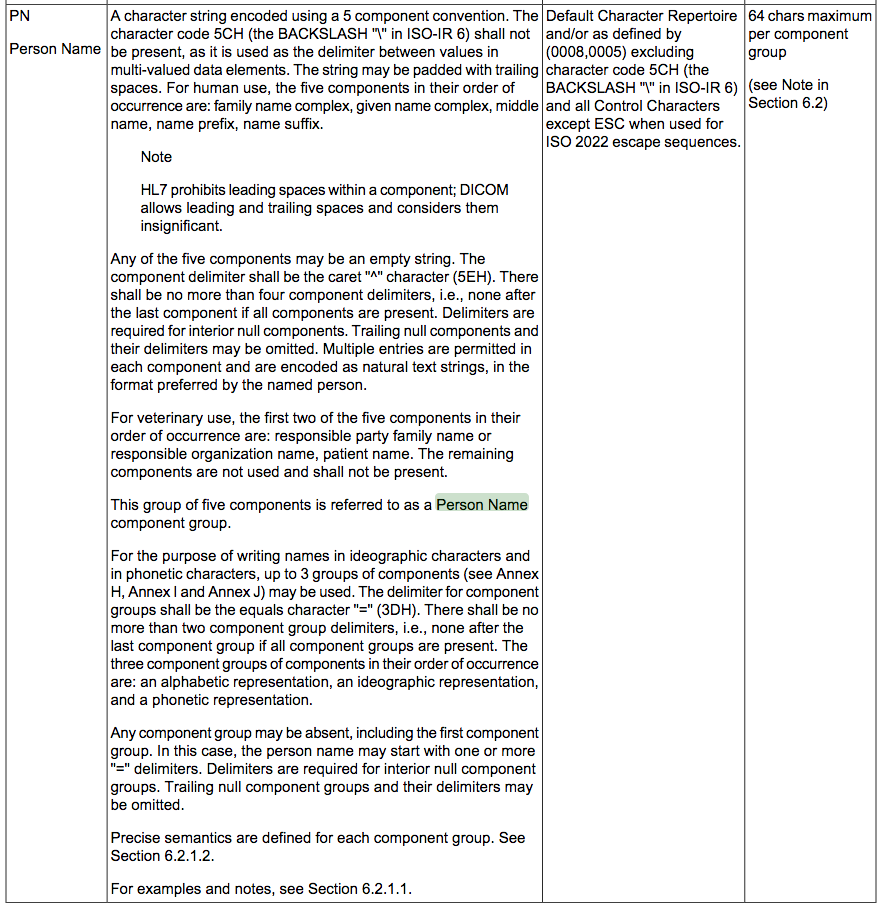Just a follow up about this thread. I found a post on SO that has a much more detailed template for a MWL with tag sequences:
Stack Overflow Thread re: MWL’s
I have not tried that yet, but that looks like a format to use tag sequences like I mentioned above, and then I will be able to verify with the method you outlined above.
Thanks.
(0008,0005) CS [ISO_IR 100] # 0, 0 CharacterSet\r\n
(0008,0050) SH [vn123] # 0, 0 AccessionNumber\r\n
(0008,0090) PN [docname] # 0, 0 ReferringPhysicianName\r\n
(0008,1030) LO [vn123] # 0, 0 StudyDescription\r\n
(0008,1080) LO [] # 0, 0 AdmittingDiagnosesDescription\r\n
(0010,0010) PN [name] # 0, 0 PatientName\r\n
(0010,0020) LO [id] # 0, 0 PatientID\r\n
(0010,0030) DA [dob] # 0, 0 PatientBirthDate\r\n
(0010,0040) CS [sex] # 0, 0 PatientSex\r\n
(0010,1020) DS [] # 0, 0 PatientSize\r\n
(0010,1030) DS [] # 0, 0 PatientWeight\r\n
(0010,2000) LO [] # 0, 0 MedicalAlerts\r\n
(0010,2110) LO [] # 0, 0 Allergies\r\n
(0010,21c0) US [] # 0, 0 PregnancyStatus\r\n
(0010,21d0) DA [] # 0, 0 LastMenstrualDate\r\n
(0010,4000) LT [vn123] # 0, 0 PatientComments\r\n
(0020,000D) UI [123.1] # 0, 0 StudyInstanceUID\r\n
(0032,1032) PN [] # 0, 0 RequestingPhysician\r\n
(0032,1060) LO [] # 0, 0 RequestedProcedureDescription\r\n
(0038,0050) LO [] # 0, 0 SpecialNeeds\r\n
(0038,0500) LO [] # 0, 0 PatientState\r\n
(0008,1110) SQ # u/l, 1 ReferencedStudySequence\r\n
(fffe,e000) - # u/l, 1 Item\r\n
(0008,1150) UI [1.2.3.4] # 0, 0 ReferencedSOPClassUID\r\n
(0008,1155) UI [100.118.116.2005.2.1.1143729853.921.1] # 0, 0 ReferencedSOPInstanceUID\r\n
(fffe,e00d) - # 0, 0 ItemDelimitationItem\r\n
(fffe,e0dd) - # 0, 0 SequenceDelimitationItem\r\n
(0008,1120) SQ # u/l, 1 ReferencedPatientSequence\r\n
(fffe,e000) - # u/l, 1 Item\r\n
(0008,1150) UI [1.2.3.4.5] # 0, 0 ReferencedSOPClassUID\r\n
(0008,1155) UI [100.118.116.2005.2.1.1143729853.921.3] # 0, 0 ReferencedSOPInstanceUID\r\n
(fffe,e00d) - # 0, 0 ItemDelimitationItem\r\n
(fffe,e0dd) - # 0, 0 SequenceDelimitationItem\r\n
(0040,0100) SQ # 120, 1 ScheduledProcedureStepSequence\r\n
(fffe,e000) na # 112, 1 Item\r\n
(0008,0060) CS [US] # 0, 0 Modality\r\n
(0040,0001) AE [] # 0, 0 ScheduledStationAETitle\r\n
(0040,0002) DA [20201001] # 0, 0 ScheduledProcedureStepStartDate\r\n
(0040,0003) TM [] # 0, 0 ScheduledProcedureStepStartTime\r\n
(0040,0006) PN [] # 0, 0 ScheduledPerformingPhysicianName\r\n
(0040,0007) LO [USG] # 0, 0 ScheduledProcedureStepDescription\r\n
(0040,0008) SQ # 40, 1 ScheduledProtocolCodeSequence\r\n
(fffe,e000) na # 32, 1 Item\r\n
(0008,0100) SH [1] # 0, 0 CodeValue\r\n
(0008,0102) SH [1] # 0, 0 CodingSchemeDesignator\r\n
(0008,0103) SH [1] # 0, 0 CodingSchemeVersion\r\n
(0008,0104) LO [1] # 0, 0 CodeMeaning\r\n
(fffe,e00d) na # 0, 0 ItemDelimitationItem\r\n
(fffe,e0dd) na # 0, 0 SequenceDelimitationItem\r\n
(0040,0009) SH [1] # 0, 0 ScheduledProcedureStepID\r\n
(0040,0010) SH [] # 0, 0 Scheduled Station Name\r\n
(0040,0011) SH [] # 0, 0 Scheduled Procedure Step Location\r\n
(0040,0012) LO [] # 0, 0 Pre-Medication\r\n
(0032,1070) LO [] # 0, 0 Requested Contrast Agent\r\n
(0040,0400) LT [] # 0, 0 CommentsOnTheScheduledProcedureStep\r\n
(fffe,e00d) - # 0, 0 ItemDelimitationItem\r\n
(fffe,e0dd) - # 0, 0 SequenceDelimitationItem\r\n
(0040,1001) SH [] # 0, 0 RequestedProcedureID\r\n
(0040,1002) LO [] # 0, 0 ReasonForTheRequestedProcedure\r\n
(0040,1003) SH [] # 0, 0 Requested Procedure Priority\r\n
(0040,1004) SH []

